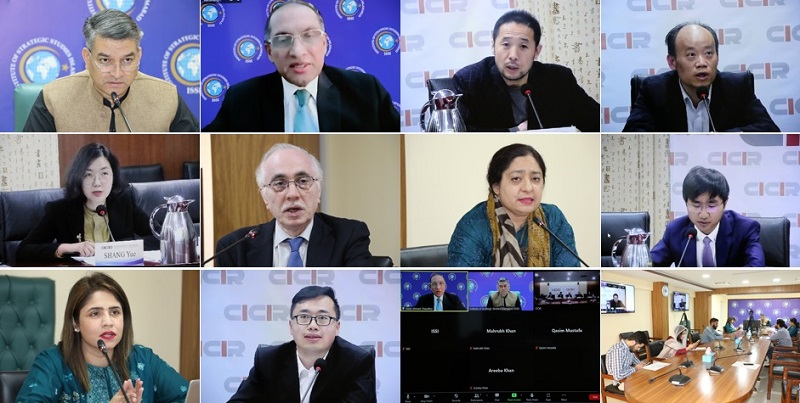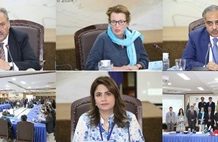PRESS RELEASE
ISSI-CICIR Virtual Roundtable
April 7, 2022

The Institute of Strategic Studies Islamabad (ISSI) in joint collaboration with the China Institutes of Contemporary International Relations (CICIR) organised a virtual roundtable on April 7, 2022. The esteemed participants included: Dr. FU Xiaoqiang, Vice President CICIR; Amb. Aizaz Ahmad Chaudhry, Director General ISSI; Dr. WANG Shida, Deputy Director, Institute of South Asian Studies, CICIR; Dr. Wang Shida, Deputy Director, Institute of South Asian Studies, CICIR; Dr. Talat Shabbir, Director China-Pakistan Study Centre, ISSI; Dr. SHANG Yue, Deputy Director, Institute of Euraisan Studies, CICIR; Amb Masood Khalid, Former Amb. of Pakistan to China; Dr. HU Shisheng, Director, Institute of South Asian Studies, CICIR; Dr. Sameera Imran, Assistant Professor, National Defence University; Dr. YAN Shuai, Deputy Director, Institute of International Security Studies, CICIR; Ms. Amina Khan, Director Centre for Afghanistan, Middle East and Africa (CAMEA), ISSI.
Dr. Fu Xiaoqiang, Vice President CICIR, in his opening remarks said that Pak-China relations have gone through a historic change since the inception of China-Pakistan Economic Corridor (CPEC). He said that it is the flagship project of China’s Belt and Road Initiative (BRI) and it is meant to alleviate the socio-economic woes of Pakistan. He cautioned against the pitfalls of bloc politics which is looming over the horizon and could curtail the steady flow of Pak-China relations. Amb. Aizaz Chaudhry complimented him for encouraging the think-tank cooperation between both sides. He was on the same page regarding the dangers of the bloc-politics. Touching upon the recent war in Ukraine, he was of the view that the military escalation should be put to an end however the Russian security apprehensions must also be addressed.
In the session I, Global and Regional Impacts of Ukraine Crisis, Amb. Masood Khalid commented that this Eurasian conflict has reshaped the geostrategic landscape of Europe and have exposed the long-standing fissures among the democracies on European peninsula. Dr. Shang Yue maintained that the crisis marked the end of Russia’s quest of its rightful place in Europe and, with its bold move, Moscow has challenged the US global supremacy. Dr. Sameera Imran argued that the Ukrainian invasion has worsened the condition of food security in the post-pandemic South Asia. Dr. Hu Shisheng stated that the global financial situation is worse due to sever imbalance in payments and disruption in supply chain. The countries having cordial relations with Russia are in a tight spot. For instance, India is heavily deponent on Moscow for its arms supply and not following the US lead will get New Delhi in trouble. The developing countries will bear the brunt of Russo-Ukrainian military escalation.
In the Session II, Review and Prospect over the Situation in Afghanistan, Dr. Yan Shuai said that after the Taliban took over in Kabul, the security environment improved overall. However, there is still a fertile ground for the terrorist organizations such as al-Qaeda, ISIS, IS-KP, and ETIM. In order to remain credible, the Taliban will have to comply to the international norms and present a moderate face. Ms. Amina opined that the Taliban government is confronted with the myriad of challenges right now and the biggest ones are the non-existent economy of the country and weak institutions. Unless the financial situation in the country improves, Afghanistan will remain a breeding ground for the terrorist organizations. Dr Wang Shida touched upon the humanitarian crisis in Afghanistan and stated that the US aid goes back to the US and, contrary to this, Chinese aid comes in the form of food assistance and helping in facilitating the land routes and air corridors for providing humanitarian assistance to the war-stricken people. Dr. Talat Shabbir offered a comprehensive view of the current Afghan situation and emphasised upon employing a consolidated regional approach towards Kabul.
The roundtable ended with closing remarks by Dr. Talat Shabbir and Dr. Hu Shisheng.











